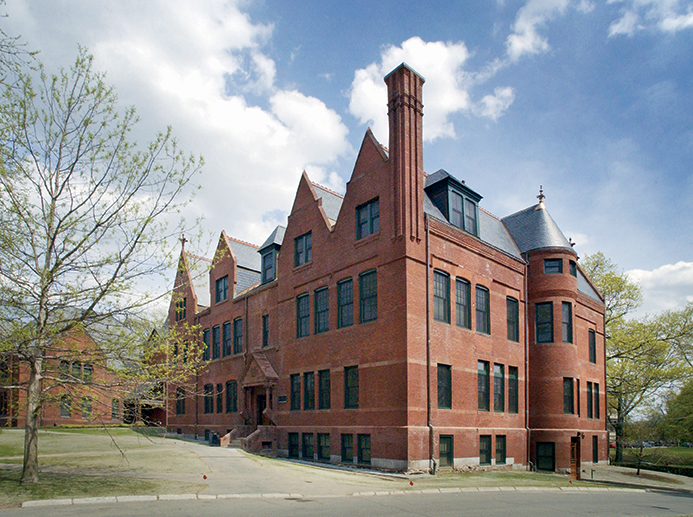SSW Buzz! General Notices
Check out the NEW SSW Website!
For more information, visit https://www.smith.edu/ssw/
NASW Foundation Fellowship and Scholarship Awards
2017-2018 Social Work HEALS Doctoral & Policy Fellowships
APPLICATIONS ACCEPTED THROUGH MARCH 8, 2017
Applicants must be members of CSWE and NASW in good standing
Applicants either must be or plan to be enrolled in a social work degree program to maintain eligibility. Awardees must maintain active membership throughout the award period. Applicants who are current members in good standing can apply for a scholarship using their current membership ID number. Non-members interested in applying can join NASW if they 1) have a social work degree (BSW/MSW) or are matriculating in a CSWE-accredited social work program, or 2) are enrolled in or awaiting acceptance into a CSWE-accredited program. Applicants awaiting acceptance into a CSWE-accredited program must include, with the membership form, their application to the MSW program with a letter from the college/university verifying the application has been received. To apply for NASW membership visit www.socialworkers.org and select “join online“, or download and complete NASW‘s “Membership Application“. New members will receive email confirmation of membership, which will include a member ID and password.
Applicants who download and complete a member application can submit it with dues payment, their application to an accredited MSW program and a letter verifying receipt of application via email to naswfoundation@naswdc.org , fax 202.336.8292 or US mail to NASW Foundation, 750 First St NE Ste 800, Washington DC 20002. Membership applications will be processed within 5 working days and applicants will receive email confirmation with member ID, username and password. Membership dues will not be refunded.
For assistance with membership, please contact NASW Member Services at 800-742-4089.
The deadline to submit a completed fellowship/scholarship application is March 1, 2016.
For more information, visit http://naswfoundation.org/default.asp
NASW Foundation Fellowship and Scholarship Awards
Applicants either must be or plan to be enrolled in a social work degree program to maintain eligibility. Awardees must maintain active membership throughout the award period. Applicants who are current members in good standing can apply for a scholarship using their current membership ID number. Non-members interested in applying can join NASW if they 1) have a social work degree (BSW/MSW) or are matriculating in a CSWE-accredited social work program, or 2) are enrolled in or awaiting acceptance into a CSWE-accredited program. Applicants awaiting acceptance into a CSWE-accredited program must include, with the membership form, their application to the MSW program with a letter from the college/university verifying the application has been received. To apply for NASW membership visit www.socialworkers.org and select “join online“, or download and complete NASW‘s “Membership Application“. New members will receive email confirmation of membership, which will include a member ID and password.
Applicants who download and complete a member application can submit it with dues payment, their application to an accredited MSW program and a letter verifying receipt of application via email to naswfoundation@naswdc.org , fax 202.336.8292 or US mail to NASW Foundation, 750 First St NE Ste 800, Washington DC 20002. Membership applications will be processed within 5 working days and applicants will receive email confirmation with member ID, username and password. Membership dues will not be refunded.
For assistance with membership, please contact NASW Member Services at 800-742-4089.
The deadline to submit a completed fellowship/scholarship application is March 1, 2016.
For more information, visit http://www.naswfoundation.org/scholarships/
Important News from NASW!
National Association of Social Workers (NASW)
A bill was introduced in the CT legislature that would have allowed individuals with an undergraduate and/or master's degree in human services, counseling or related field to be licensed without exam as a LCSW to work in hospitals, nursing homes and home-health agencies.
The purpose of this bill was to open up the LCSW credentialing to a large segment of human service workers, and by doing so would have made a travesty of the LCSW statute.
NASW/CT immediately took action to keep this bill from being considered by the Public Health Committee where the bill was assigned. Last week, the NASW/CT chapter membership was informed by the ranking member on the Public Health Committee that the bill will not be taken up this session. As the legislation session approaches in your respective states, it is important to stay informed.
If you are not a member of the NASW, consider joining your local chapter today and get involved. Learn more about the NASW or contact your Smith NASW Student Ambassador, Jacqueline Ortiz Miller, A18.
Join DCF for one of their upcoming Social Worker Hiring Events

Become part of a hardworking, compassionate staff dedicated to the safety and protection of children. As a DCF Social Worker, you have the ability to profoundly impact lives of children and families across the Commonwealth. We are looking for dedicated and passionate individuals for these Exclusive One Day Hiring Events to be interviewed on the spot. Bachelor’s Degree is required in any of the following disciplines:
Social Work
Psychology
Human Services
Sociology
Counseling
Counseling Education
Criminal Justice
For more information, visit http://www.mass.gov/eohhs/gov/hhs-careers/social-worker-hiring-events.html
SSW Open House

As part of the College's daylong celebration of the record-breaking Women for the World campaign, the School for Social Work will be open on Saturday, March 4, for tours and conversation with Dean Marianne Yoshioka. Join us!
Published!

After two years of extensive research, which examined online peer support for queer mothers, Professor Karpman, Emily Ruppel '18, Mallory Merryman '15 & Carolyn Delk '03 saw their work published in renown journal Midwifery on March 1, 2017. From the journal:
Recent research has concluded that barriers to maternity health care exist for lesbian, bisexual, and queer women. This mixed methods study aims to understand patterns in seeking and sharing online health information for LBQ women attempting conception.
Researchers performed a qualitative content analysis of 400 discussions in lesbian-oriented Facebook groups, containing 1764 total instances of text. 400 discussions from heterosexual-oriented conception and parenting Facebook groups were examined for comparison purposes, though they will not be the focus of this analysis. This paper also presents descriptive statistics on posts observed. Read more.
Spring is in the Air

As seen in The Gate: "During March, more than 20,000 visitors will pass through the doors of Smith’s Lyman Plant House to see the annual Spring Bulb Show. This year’s show, 'Fields of Flowers,' opens Saturday, March 4, at 10 a.m., offering members of the Smith community and visitors alike a chance to escape the winter cold and discover a springtime paradise on campus.
Ph.D. Student Ronjonette Harrison, L.C.S.W. Featured by Clark Atlanta University

ATLANTA (FEB. 28, 2017)--Ronjonette N. Harrison, LCSW, knows that severe childhood trauma can imprison its victims. She also knows that healing, with appropriate treatment and support, is fully possible. That reality is much more than a career goal for the Smith College doctoral student, presently interning as a doctoral research assistant in Clark Atlanta University’s Whitney M. Young Jr. School of Social Work. She has dedicated all of her energies to addressing issues of interpersonal trauma, mental health challenges and the adverse effects of criminal justice involvement for youth and women of color.
“I consider myself an advocate, a voice for individuals and families grappling with abuse, victimization and marginalization,” she says.
Harrison, who earned the bachelor’s degree in social work at State University College at Buffalo and the master of social welfare degree at State University of New York at Stony Brook, is in the final phases of completing the Ph.D. in social work at the prestigious Smith College School for Social Work in Northampton, Mass. Her desire to intern at CAU is, perhaps, associated with an earlier “disconnect” that shaped her perspectives on social work education.
“I entered undergraduate school with little support, resources or direction,” she recalls. I became aware of the social work profession while taking an elective course, “Social Work with Minority Families.” It sparked an intense range of emotions, and my passion for the field was instant and all-consuming. I knew this was my calling.” But a young Harrison faced one glaring hurdle. “Although my teachers were talented and committed to the student body,” she continued, “there was a disconnect because faculty often were not representative of the client [minority] population. Their theoretical perspectives significantly differed from my experiences and those in my community.”
That episode stuck with Harrison over the past 15 years. So, when time to satisfy Smith College’s doctoral research internship requirement, she knew she wanted to do so on an HBCU campus. “As a social worker, you can’t stand in footsteps any more resonant than W.E. B. Du Bois and Whitney M. Young Jr.,” Harrison says. “And both sets of iconic footprints lead you to Clark Atlanta University. W.E.B. Du Bois founded contemporary sociology on this campus, and activist and advocate Whitney M. Young Jr. was the School of Social Work’s first dean. They are legends for anyone in this field, regardless of one’s race. CAU is ‘ground zero’ for anyone who is serious about shaping the future of social work.”
But is it necessary for an African-American to connect with other minority clients? And does legacy translate into policymaking, Harrison’s ultimate goal? Harrison says that not to immerse herself in the client population would be irresponsible. “African Americans are not a monolith. Clark Atlanta provides an opportunity, and central proximity to the metro-Atlanta community, for me to advance my own research interests--exploring associations between betrayal trauma and criminal pathways of incarcerated women of color--immersed in diverse client subpopulations that have been or will be directly or indirectly affected by this issue based upon a number of factors, age, social identity and economics among them.” She also noted that while CAU’s social work legacy is irreproachable, the value proposition that led her to the program is the School’s multiple ties to the policymaking arena. “There is a pervasive, infectious sense of activism, of change agency here that challenges and fuels my own aspirations.”
Harrison’s time at CAU isn’t governed by self-interest. The published author, who is simultaneously completing a clinical internship at neighboring Spelman College Counseling Services, also is working with CAU Professor Joi G. Showell, Ph.D., to evaluate the licensure test results of the Whitney M. Young Jr. School of Social Work’s MSW students, providing data that better allows school faculty and staff to facilitate licensure preparedness among graduates. She also looks forward to contributing to research efforts among other faculty and staff.
Whitney M. Young, Jr., School of Social Work Dean Jenny L. Jones, Ph.D., says what Harrison brings to the program affirms the legendary foundation upon which the School’s national reputation is anchored. “What Ronjonette brings to the program reaffirms the character of our School and honors the standards of excellence set by our forebears,
W. E. B. Du Bois and Whitney M. Young J